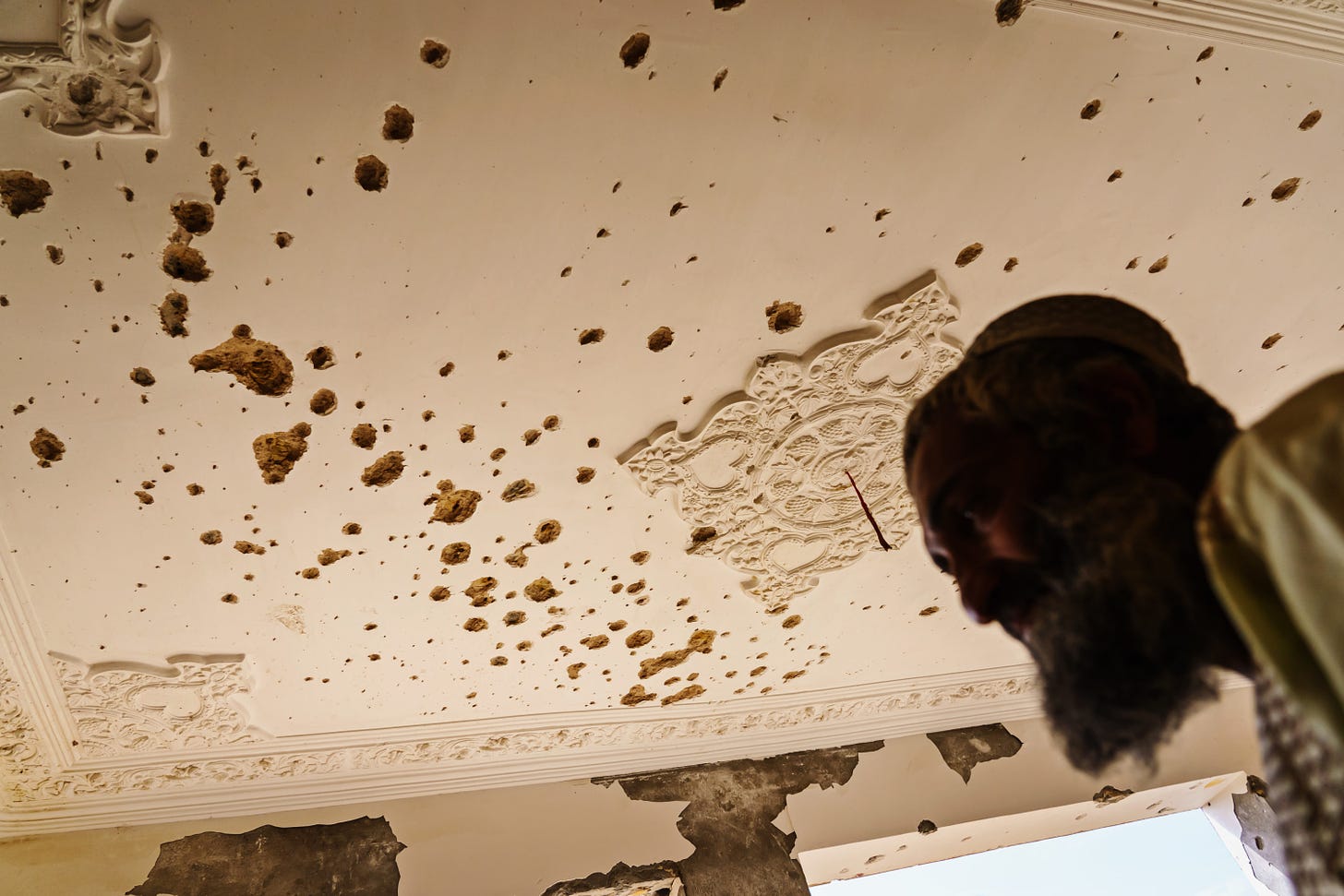The U.S. Should Support Afghanistan’s Northern Resistance
The fighting remnant of the Afghan armed forces is now coalescing—and is Afghanistan’s last hope.

In April 2001, an Afghan warlord visited the European Parliament in Brussels. Ahmad Shah Massoud had fought against the Soviets as a mujahid. Then, as Taliban forces swept through Afghanistan in the 1990s, Massoud fought them. A fierce warrior and savvy political operator whose views of Islam were far more liberal than those of the Taliban, he led the resistance—the Northern Alliance, or United Front. He survived countless assassination attempts. And he came to Brussels with a request and a warning. He wanted support from the rich Western countries. And he wanted to let them know that Osama bin Laden, holed up in Afghanistan, was planning an attack.
Five months later, back in Afghanistan, Massoud granted an interview to two men posing as foreign reporters. They hid bombs in their camera equipment, and killed him.
The date was September 9, 2001.
The story of the last two decades in Afghanistan might have been very different had Massoud not been assassinated. Today, as the Taliban once again takes over Afghanistan, the Northern Alliance has been reestablished and rebranded: It’s the Northern Resistance, this time led by Massoud’s son, Ahmad Massoud, who was just 12 years old when his father was killed. Joining Massoud fils is Amrullah Saleh, the vice president of the Afghan government before the fall of Kabul, currently claiming to be the acting president.
Massoud and Saleh are both liberal. Saleh, charismatic, extremely anti-Taliban and anti-Pakistan, was brought into the Ashraf Ghani administration as a balancing force against the Taliban-friendly chief executive of Afghanistan, Abdullah Abdullah, currently heading the transition. Saleh got his start in politics by joining Massoud père in the 1990s. He, too, has survived many assassination attempts. He seems to be a man of good judgment and principle; earlier this week, he pledged to “never be under one ceiling with Taliban.”
Massoud is different. He has yet to show his father’s charisma—this is not to say he doesn’t have it in him, as it is exactly times of duress that reveal one’s character. He earned his bachelor’s degree from the Sandhurst Military Academy and his master’s degree in war studies from King’s College London. He and Saleh complement one another: Massoud was born into war, and Saleh joined it voluntarily. Saleh has fought on the battlefield, and Massoud has studied war. Massoud kept a low profile despite his legendary father’s immense political legacy, and Saleh took a shot at becoming president. Somehow, they have arrived at the same point, heading for the same destination.
They have retreated to the north with thousands of well-trained men formerly of the Afghan armed forces under their command—estimates range from 6,000 to 10,000. They are in the Panjshir province, the only one the Taliban doesn’t currently control, which was also under the control of the Northern Alliance the last time the Taliban controlled Afghanistan.
All of which now raises important questions: How should the United States, hastily departing the country, treat these resistance forces? What should we think of them?
It is essential that the United States and other freedom-loving countries form a coalition to buy the resistance as much time as possible to establish themselves and form a new strategy that is not reliant on American support.
There are major differences between Afghanistan in the 1990s and today. The last time the Taliban marched to Kabul to overtake the government, the country was susceptible to a theocracy. First, Afghanistan was coming out of a civil war. Even an atheist finds God in a foxhole, it is said, and Afghans had been in a foxhole for almost two decades. Second, theocracy had never been tried in Afghanistan—at least not in recent memory—for its failings to be exposed. It is different this time, with the evils of the previous Taliban regime vividly remembered by any Afghan over the age of 25. Third, many of the Taliban were the triumphant fighters who had expelled the godless Soviet aggressors who had invaded their country.
Revolutions succeed in sustaining themselves because they initially have enough popular legitimacy to grow roots—which the Taliban had in the 1990s. Not this time. The Taliban have no popular mandate. Today’s Taliban can’t claim they liberated Afghans from the Soviets. They are the heirs of the thugs who did so terrible damage and ignited a war in Afghanistan.
The Taliban may have overrun the country, but they seem to know that, this time around, they will find it much more difficult to subjugate the Afghans—hence the signals they are sending that there will not be revenge killings and that they won’t undo all post-2001 liberalization. (These promises must be dismissed.) Their effort to take over the entire country could be stymied if the free world sends support and signals of hope to the resistance. On Wednesday, Massoud made this plea in the Washington Post:
America and its democratic allies do not just have the fight against terrorism in common with Afghans. . . . We now have a long history made up of shared ideals and struggles. There is still much that you can do to aid the cause of freedom. You are our only remaining hope.
Massoud and Saleh might be the right men for the job, and they might not. Tens upon tens, hundreds upon hundreds, and thousands upon thousands of intelligence analyses will be forthcoming on how reliable they are, to advise President Joe Biden and other policymakers on how to understand and deal with the resistance. That’s a waste of time. We will never know until we try. And we have no other option: They are all the Afghans—and we—have left. For now, the least we could do is to buy them time.


